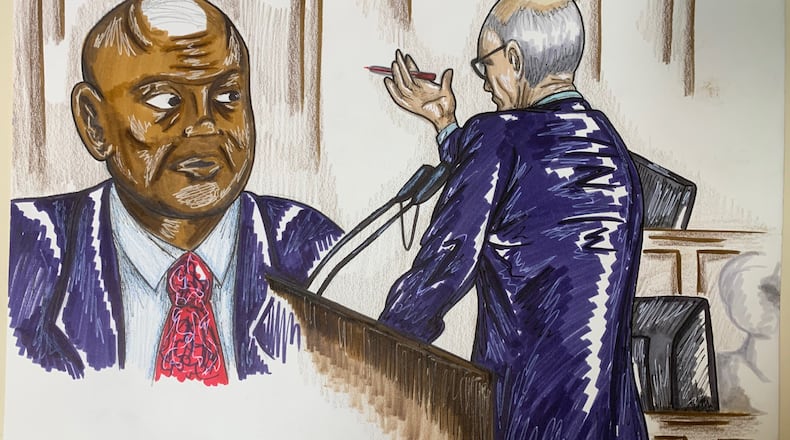Clayton County Sheriff Victor Hill took the stand Thursday to defend himself against federal charges he violated the civil rights of detainees by strapping them in restraint chairs as punishment at the south metro Atlanta jail he runs.
In the trial in U.S. District Court, Hill told jurors that he uses the devices to protect both jail staff and detainees if they show aggressive behavior when they arrive at the jail, or if the actions that led to their arrests suggest they may be volatile once inside the facility — something he called “pre-attack indicators.”
“The best proactive use of force is restraint,” he said.
Federal prosecutors indicted Hill in April 2021 on charges that he used restraint chairs not for their intended purpose, which is to calm a detainee or protect that person from harming himself or others.
Rather, prosecutors allege the sheriff used them as punishment in the case of seven detainees, including a 17-year-old who had trashed his home after arguing with his mother about wi-fi issues over video games.
Hill has pleaded not guilty.
The controversial sheriff, who dubbed himself “The Crime Fighter” and uses the “bat signal” as one of his signatures, took the stand in the seventh day of testimony, one day after the government rested its case.
He pushed back on accusations that he was responsible for several of the detainees named in the indictment urinating on themselves after spending hours in the devices. He said he expected that whenever he ordered someone strapped to the chair that staff would follow the facility’s rules, which require jailers to check on detainees every 15 minutes that they are confined to the devices.
He also said that the devices are safe, and that was one of the reasons he purchased them for the jail in 2018. He said repeatedly that to his knowledge no inmates had been hurt while strapped in the chair.
The statement contradicts photos and videos prosecutors have shown throughout the trial of several of the detainees with red welts in areas where their hands were handcuffed behind their backs. A photo of deep red gashes in both of detainee Desmond Bailey’s wrists caused many in the courtroom to gasp when they were displayed last week.
Hill, who spoke directly to the jury in a calm and measure tone, also took aim at many of the detainees’ testimonies and prosecutors allegations.
He said when he spoke to Chryshon Hollins, the teen who went on a rampage in his home, that he was forceful because he was trying to deter the now 19-year-old from ever returning to the jail.
“I try to be as forceful as possible, especially with younger people” he said. “I try to speak in a convincing tone.”
He also addressed why he responded with “chair” when a deputy first sent him a photo of Hollins as the youth sat in the back of a squad car, long before the young man ever got to the jail. Hill said “prior knowledge” of a detainee’s behavior has an impact on his decisions about potential conduct and that Hollins’ destruction of his home suggested he would also destructive in jail.
Despite Hollins’ actions, Hill said he was not aware that the teen had been put in the chair twice — once after Hollins first arrived at the jail and again after Hill went to talk to him the next morning.
“I was made aware of (that) through this investigation,” he said. “No, that was not my intent.”
In the case of Glenn Howell, a Butts County landscaper for whom Hill swore out an arrest warrant on harassing communications after the two bickered over the phone, the sheriff said he was simply trying to prevent an issue from escalating. Hill had called Howell on behalf of one of the sheriff’s deputies, Lt. Josh Guthrie, who was in a dispute with Howell over service the landscaper had provided.
Hill said he was concerned because his deputy seemed scared after alleged encounters with Howell, which included phone calls, Howell driving several times by Guthrie’s home and Howell allegedly running Guthrie’s girlfriend off the road.
“After I found out about the threats, I thought I can talk to him,” Hill said of Howell. “Maybe I can calm the situation down.”
But their discussions, which included phone calls, texts and Facetime, deteriorated the more they spoke, Hill said. He said Howell used numerous expletives in their conversation — a fact Howell admitted Wednesday during cross examination on the stand — and that Hill eventually hung up on Howell during their last conversation.
“Based on the way he acted with me it was evident he never was going to stop,” Hill said.
Howell turned himself to the jail the Monday after the warrant was issued. Once there, he was confronted by Hill, who had him put in the restraining chair. The sheriff said Howell was very aggressive and that past discussion suggested to him that Howell did not respect law enforcement officials.
A video of their meeting in the jail played in court but did not have sound.
“We know that these kind of people are definitely a threat to jail security,” he said. “He probably should have been restrained before I got there.”
The Latest
Featured



